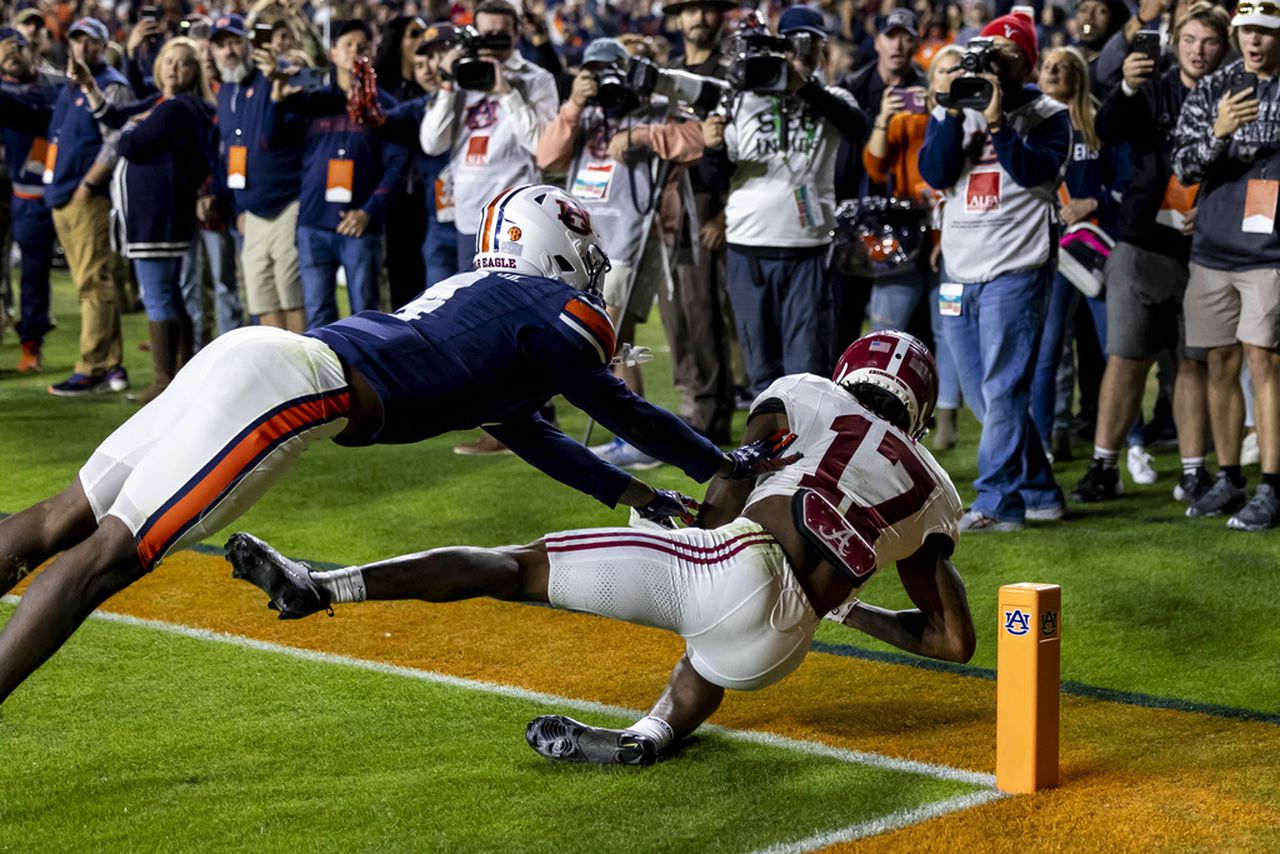Auburn’s DJ James was on the wrong end of 4th-and-31. How does he move on?
He talks to his old high school coaches all the time, but Tony Stonicher hadn’t heard from DJ James in a week. Stonicher — James’ high school defensive coordinator at Spanish Fort — just wanted to cheer him up.
But James was devastated. He’d faulted himself. Taken on all the blame. He’s human. And in the weeks after the Iron Bowl, it hit hard.
To be on the wrong side of a moment that will live forever in the lore of a historic rivalry, to be in the photo for fans in Jordan-Hare Stadium that day to show their kids and replays to play for years to come, it takes a mental toll. In a game with so many moments that led to Auburn’s 27-24 loss to Alabama in November, James’ attempt to stop a leaping Isaiah Bond is the image engrained.
The play has several names. It goes by just 4th-and-31, the Milroe Miracle or maybe the more official name: Gravedigger.
It wound up as James’ final play in an Auburn uniform. There was backlash online as James — warranted or not — became a scapegoat to some. For every memorable win, someone has to lose.
And it stuck. James is from Mobile. He grew up in the Iron Bowl. He understands what it means. He understands how badly his team and fanbase wanted to beat Nick Saban and how he’d been the one left all alone in the corner of the endzone for a defining moment he’ll forever be on the wrong end of.
Stonicher said it took James a full month to truly get over it all.
Alabama wide receiver Isaiah Bond (17) catches a touchdown pass in the final minute on a fourth-and-long play to secure a win over Auburn during the second half of an NCAA college football game, Saturday, Nov. 25, 2023, in Auburn, Ala. (AP Photo/Vasha Hunt)AP
Athletes — especially here, at the highest level of college football — are often asked to be so supremely mentally strong and able to move on. A Ted-Lasso-coined memory of a goldfish. Coaches often make the task seem so simple: play the next play.
James didn’t have a next play.
And even if he did, how should he be expected to just move on from a moment like that so fast?
“He took that really bad,” Stonicher said. “He took that really hard. To tell you the truth, I’d be disappointed in him if he didn’t.”
***
Stories are meant to come full circle. And sometimes they work out so conveniently.
The final play of James’ college career came against Alabama but, frankly, that was nearly the school James attended.
At Spanish Fort, James was committed to Oregon. He was planning to go to Oregon.
Signing day was Feb. 6, 2019. Spanish Fort’s ceremony was supposed to start at 11 a.m., but James was late.
Alabama had called James that morning to offer him a last-minute spot, Ben Blackmon — James’ coach at Spanish Fort and now the head coach at Enterprise — said.
“Alabama was trying to hold him off from signing with Oregon until later that afternoon in case either they didn’t get a kid they thought,” Blackmon said.
James thought about it. His chair sat empty at signing day while his classmates put their names on the paper for their respective schools and took photos before, at last, James arrived. He told Alabama no.
“This has been a crazy recruiting process,” James said then.
That meant his first college game with Oregon was the 2019 season opener against Auburn in Dallas.
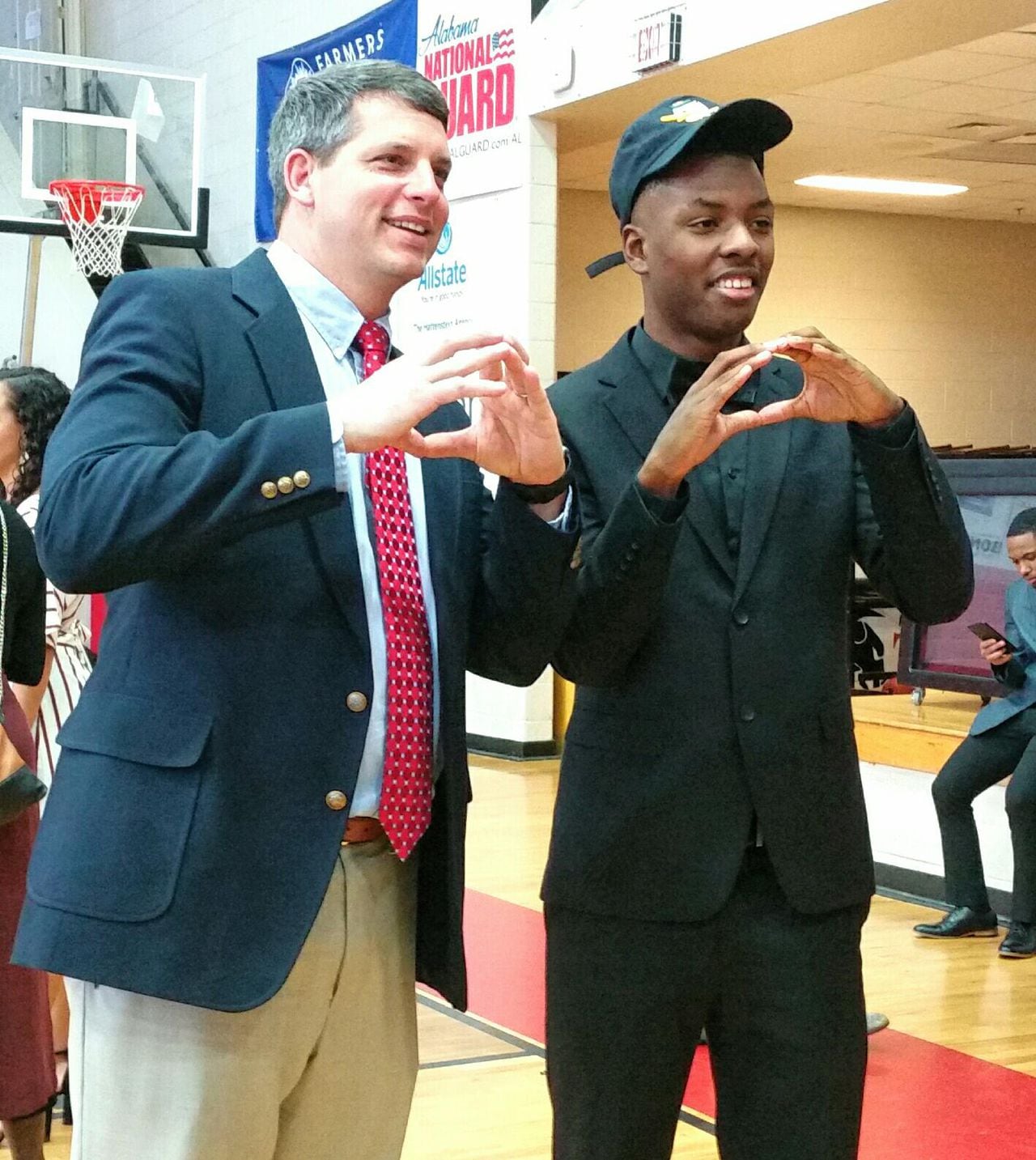
Spanish Fort defensive back D.J. James (right) and Toros football coach Ben Blackmon make O’s for Oregon after James signed a letter-of-intent with the Pac-12 school on Wednesday, Feb. 6, 2019, at Spanish Fort High School. (Mark Inabinett/[email protected])
James said Alabama’s involvement in the final hours of his recruitment made him re-evaluate his thoughts because he always knew he wanted to play in the SEC — to play closer to home.
But James committed to Oregon under then-head coach Mario Cristobal. Cristobal suddenly left Oregon in 2021 to take the head job at Miami. Oregon hired Dan Lanning and James entered the transfer portal.
Auburn needed help in the secondary heading into 2022 with the departure of Roger McCreary. So Auburn offered James the chance to come home. This time was much more simple. James said yes.
It meant he’d have to face Alabama in his final college game.
***
James was the very last Auburn player on the sideline that night. He sat on the bench with glazed eyes wrought with the shock. He was stunned. Heartbroken. Grappling with the reality of what had all just happened over the final 43 seconds on the clock.
He sat there unmoved for more than 10 minutes, his hands on his face. James only stood up when he had to: the equipment staff just wanted to clean up the benches.
So former Auburn safeties coach Zac Etheridge and former Auburn team captain Elijah McAllister guided James back to the locker room. No words were shared. No words were needed.
James was never supposed to get left in the corner of the endzone like that.
Head coach Hugh Freeze later described the play as a decision between whether to rush Alabama quarterback Jalen Milroe or to drop everyone back in coverage. Auburn rushed two, left eight in coverage and had linebacker Eugene Asante roam as a spy on Milroe in case he ran.
Freeze received criticism for only rushing two and using a spy, which was essentially ineffective compared to another player in coverage.
“That’s the choice we made,” Freeze said on Nov. 27. “I can show you still shots. I’ve taken pictures of every still shot from the 10-yard line in, and, I mean, we are in perfect position. We’ve got three over two. So either we didn’t coach it well enough, or we didn’t execute it well enough, and it’s probably a combination of both.”
Auburn called a timeout before the fourth down play after Alabama initially lined up. They discussed how to match up. Auburn still had eight players in coverage against five Alabama receivers.
Blackmon thinks there was a communication error. Stonicher blamed coaching.
Whatever happened, James was left in a one-on-one matchup with Bond. Bond won it. And it wrecked James.
“In his mind, it wasn’t anybody’s fault but his,” Stonicher said. “‘I got beat on the play that mattered the most in the game.’”
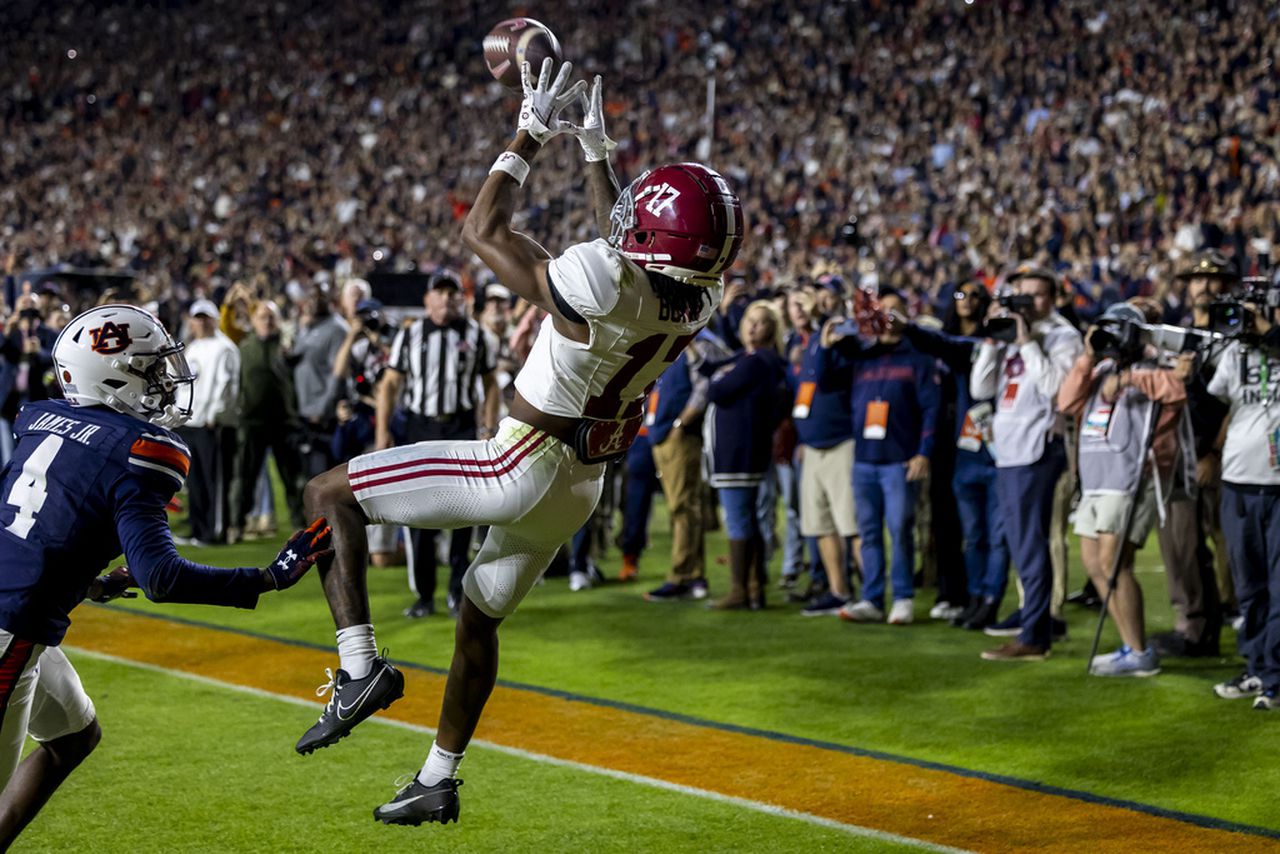
Alabama wide receiver Isaiah Bond (17) catches a touchdown pass in the final minute on a fourth-and-long play to secure a win over Auburn during the second half of an NCAA college football game, Saturday, Nov. 25, 2023, in Auburn, Ala. (AP Photo/Vasha Hunt)AP
That’s why James was stunned on the sidelines. It’s why the play resigned with him for a month after the game, replaying in his head over and over. James wanted a chance to do it over. Even for how he got left alone, to just have one more chance to make that play.
Somehow, James had to get that taste out of his mouth.
***
It’s Thursday at the NFL Combine now and James is standing at his podium in Indianapolis. It’s been 96 days since the Iron Bowl.
Moving forward takes time.
“It was hard for me,” James told AL.com in Indianapolis. “I just know I’m the type of guy that’s hard on myself. I gotta make that play. If I could do it over, I’ll make that play.”
James can more comfortably think back to that November night now. But it took weeks to get there.
It’s important to move on, to be able to have the chance to get back and play the next play. James couldn’t do that. He never had the opportunity. He had to wait. To not return to the field against Alabama. To not play in the bowl game. To stew on it until he could finally play again at the Senior Bowl in the beginning of February in his hometown.
“Get to work,” Stonicher said. “You can make it all better. And he knew all that. He just needed some time to separate himself from it.”
It would be two months between 4th-and-31 and putting on pads again. All he could do in between was train. So he did.
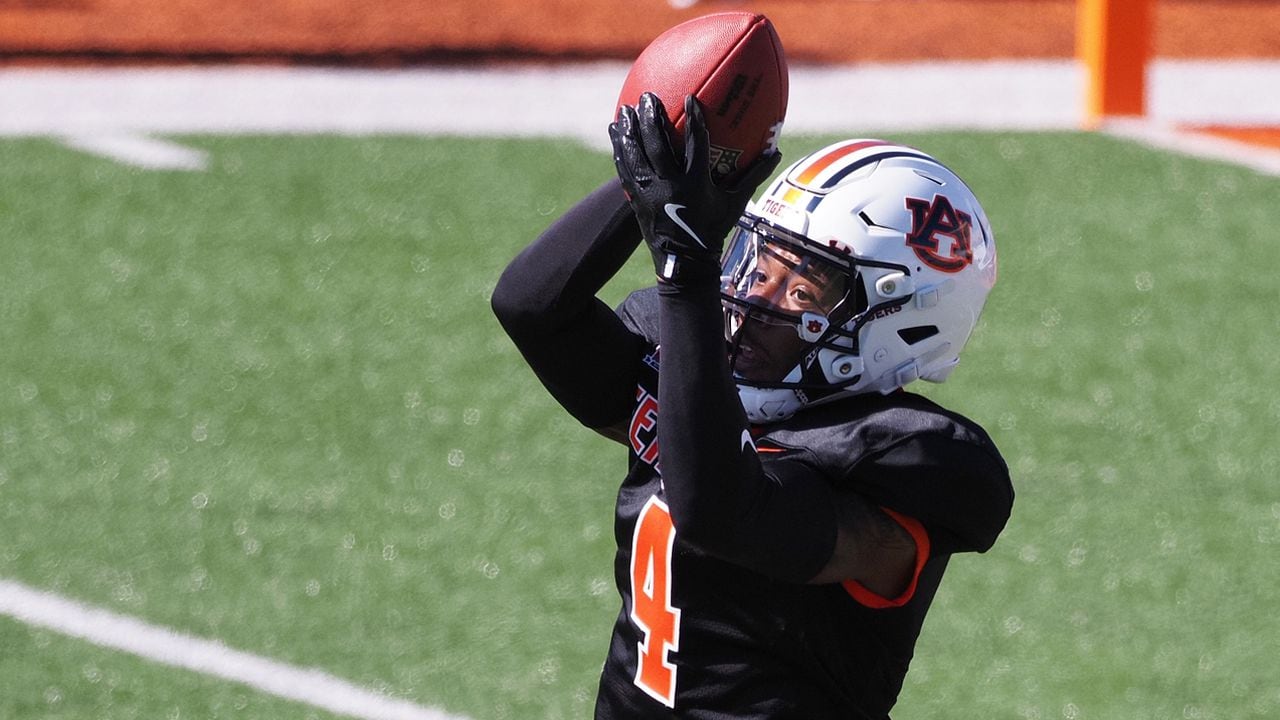
American team cornerback D.J. James of Auburn practices for the Reese’s Senior Bowl on Tuesday, Jan. 30, 2024, at Hancock Whitney Stadium in Mobile, Ala. (Mike Kittrell/AL.com)
Mike Kittrell/AL.com
“Getting back in and playing I think was really good for DJ to go to the Senior Bowl and play and compete,” Blackmon said. “Get him back into the groove of playing. Getting that play off his mind and onto his future.”
Blackmon said he tells his players they aren’t failing as long as they are willing to re-tie their cleats and go again. So that’s what James had to do.
Scouts also wanted to see James gain weight to handle the NFL. His 2023 Auburn roster page listed James at 164 pounds. At the NFL Combine, James weighed in at 175 pounds.
And he still ran an impressive 4.42 second time in the 40-yard dash. It was one of the 10 fastest runs among cornerbacks.
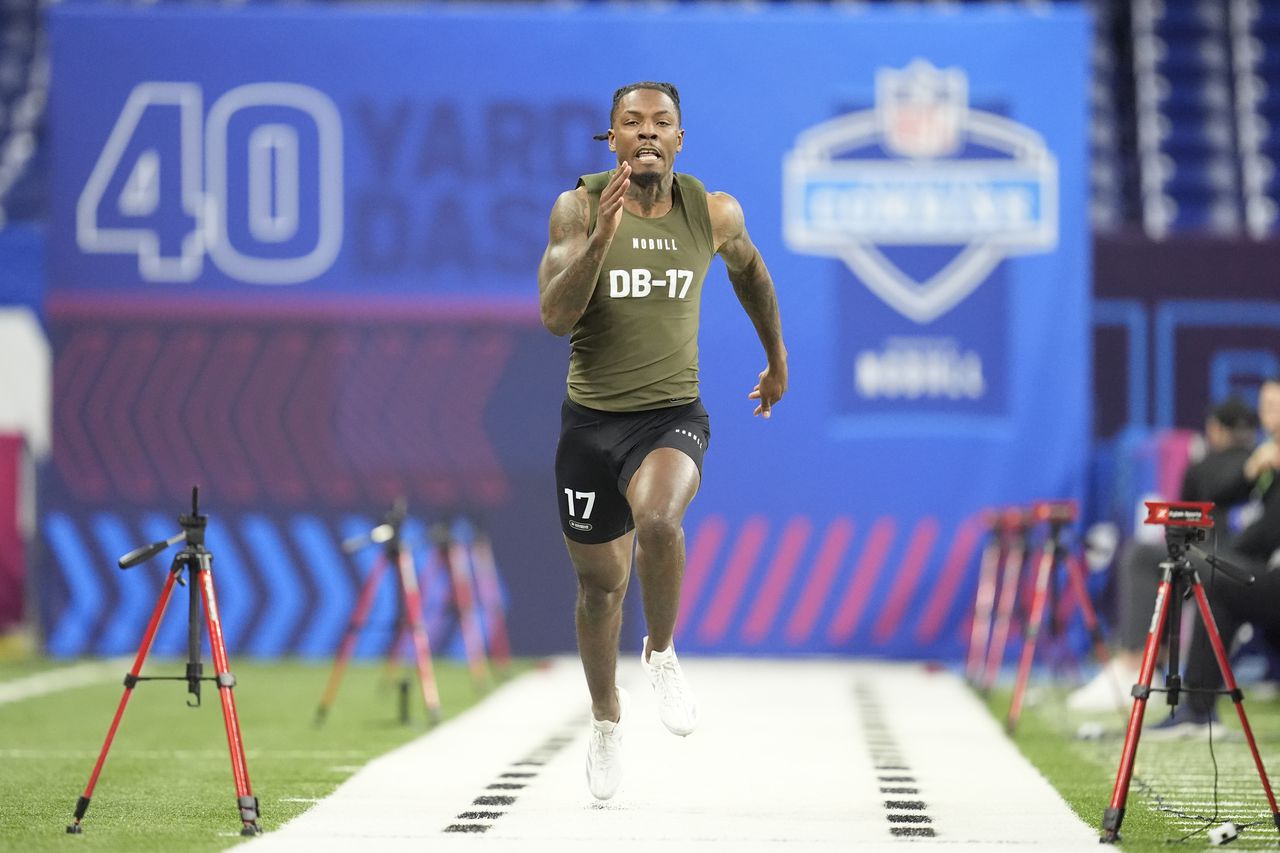
Auburn defensive back Desmond James runs the 40-yard dash at the NFL football scouting combine, Friday, March 1, 2024, in Indianapolis. (AP Photo/Michael Conroy)AP
Finally having some football behind him, 4th-and-31 is no longer heartbreak. He’s past that point. He can’t change what happened. He can’t replay that night. He can only learn from it. It’s motivation now.
“Real motivation for me,” James said. “Just looking back at that time, it put an extra chip on my shoulder going into this process as well. I’m very excited as well for it.”
Matt Cohen covers Auburn sports for AL.com. You can follow him on X at @Matt_Cohen_ or email him at [email protected]
